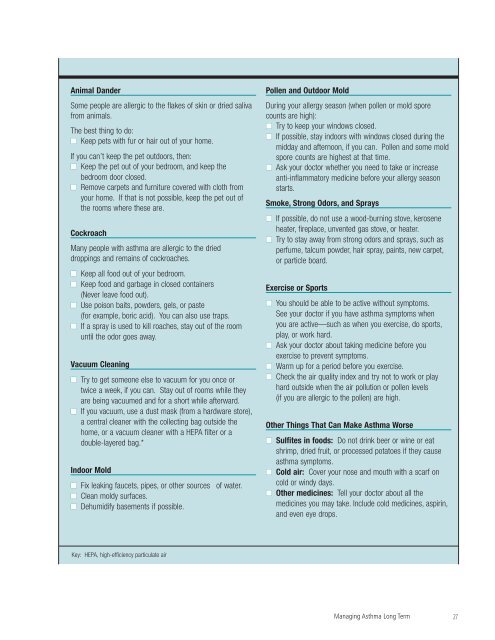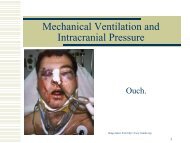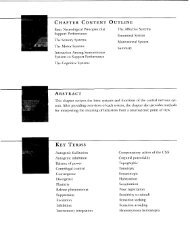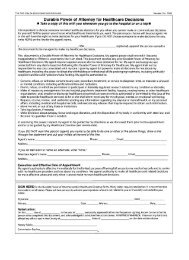Guidelines for the Diagnosis and Management of Asthma
Guidelines for the Diagnosis and Management of Asthma
Guidelines for the Diagnosis and Management of Asthma
You also want an ePaper? Increase the reach of your titles
YUMPU automatically turns print PDFs into web optimized ePapers that Google loves.
Animal D<strong>and</strong>er<br />
Some people are allergic to <strong>the</strong> flakes <strong>of</strong> skin or dried saliva<br />
from animals.<br />
The best thing to do:<br />
■ Keep pets with fur or hair out <strong>of</strong> your home.<br />
If you can’t keep <strong>the</strong> pet outdoors, <strong>the</strong>n:<br />
■ Keep <strong>the</strong> pet out <strong>of</strong> your bedroom, <strong>and</strong> keep <strong>the</strong><br />
bedroom door closed.<br />
■ Remove carpets <strong>and</strong> furniture covered with cloth from<br />
your home. If that is not possible, keep <strong>the</strong> pet out <strong>of</strong><br />
<strong>the</strong> rooms where <strong>the</strong>se are.<br />
Cockroach<br />
Many people with asthma are allergic to <strong>the</strong> dried<br />
droppings <strong>and</strong> remains <strong>of</strong> cockroaches.<br />
■ Keep all food out <strong>of</strong> your bedroom.<br />
■ Keep food <strong>and</strong> garbage in closed containers<br />
(Never leave food out).<br />
■ Use poison baits, powders, gels, or paste<br />
(<strong>for</strong> example, boric acid). You can also use traps.<br />
■ If a spray is used to kill roaches, stay out <strong>of</strong> <strong>the</strong> room<br />
until <strong>the</strong> odor goes away.<br />
Vacuum Cleaning<br />
■ Try to get someone else to vacuum <strong>for</strong> you once or<br />
twice a week, if you can. Stay out <strong>of</strong> rooms while <strong>the</strong>y<br />
are being vacuumed <strong>and</strong> <strong>for</strong> a short while afterward.<br />
■ If you vacuum, use a dust mask (from a hardware store),<br />
a central cleaner with <strong>the</strong> collecting bag outside <strong>the</strong><br />
home, or a vacuum cleaner with a HEPA filter or a<br />
double-layered bag.*<br />
Indoor Mold<br />
■ Fix leaking faucets, pipes, or o<strong>the</strong>r sources <strong>of</strong> water.<br />
■ Clean moldy surfaces.<br />
■ Dehumidify basements if possible.<br />
Pollen <strong>and</strong> Outdoor Mold<br />
During your allergy season (when pollen or mold spore<br />
counts are high):<br />
■ Try to keep your windows closed.<br />
■ If possible, stay indoors with windows closed during <strong>the</strong><br />
midday <strong>and</strong> afternoon, if you can. Pollen <strong>and</strong> some mold<br />
spore counts are highest at that time.<br />
■ Ask your doctor whe<strong>the</strong>r you need to take or increase<br />
anti-inflammatory medicine be<strong>for</strong>e your allergy season<br />
starts.<br />
Smoke, Strong Odors, <strong>and</strong> Sprays<br />
■ If possible, do not use a wood-burning stove, kerosene<br />
heater, fireplace, unvented gas stove, or heater.<br />
■ Try to stay away from strong odors <strong>and</strong> sprays, such as<br />
perfume, talcum powder, hair spray, paints, new carpet,<br />
or particle board.<br />
Exercise or Sports<br />
■ You should be able to be active without symptoms.<br />
See your doctor if you have asthma symptoms when<br />
you are active—such as when you exercise, do sports,<br />
play, or work hard.<br />
■ Ask your doctor about taking medicine be<strong>for</strong>e you<br />
exercise to prevent symptoms.<br />
■ Warm up <strong>for</strong> a period be<strong>for</strong>e you exercise.<br />
■ Check <strong>the</strong> air quality index <strong>and</strong> try not to work or play<br />
hard outside when <strong>the</strong> air pollution or pollen levels<br />
(if you are allergic to <strong>the</strong> pollen) are high.<br />
O<strong>the</strong>r Things That Can Make <strong>Asthma</strong> Worse<br />
■ Sulfites in foods: Do not drink beer or wine or eat<br />
shrimp, dried fruit, or processed potatoes if <strong>the</strong>y cause<br />
asthma symptoms.<br />
■ Cold air: Cover your nose <strong>and</strong> mouth with a scarf on<br />
cold or windy days.<br />
■ O<strong>the</strong>r medicines: Tell your doctor about all <strong>the</strong><br />
medicines you may take. Include cold medicines, aspirin,<br />
<strong>and</strong> even eye drops.<br />
Key: HEPA, high-efficiency particulate air<br />
Managing <strong>Asthma</strong> Long Term<br />
27





